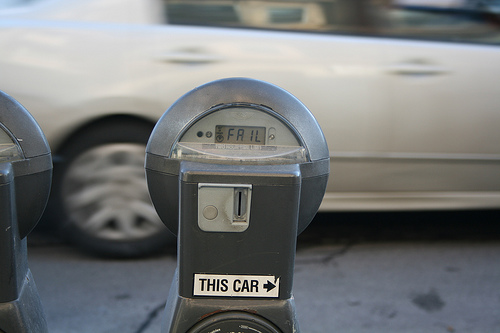I spoke on the phone yesterday with a gentleman who is just beginning to get his feet wet in the domain industry. The person has done a lot of keyword research, registered a hundreds of dollars of keyword domain names, and he is now exploring his options to begin generating revenue. I asked him if the domain names receive traffic, and he said they receive thousands of visits a month.
I was very surprised to hear that new registrations were receiving so much traffic, so I inquired further. It turns out the names aren’t parked (or being monitored) but the owner assumed Google search volume equated to type in traffic. Unfortunately, this isn’t accurate by any means, and I generally find new registrations (except hot trends) do not receive any type-in traffic at all.
I haven’t done a ton of research on the comparison between average monthly search volume in Google and type in traffic, but I thought I’d share some information I have from some of my domain names. The figures might not be entirely accurate, since some of the traffic to my sites could be repeat visitors, so I will not use sites where I know this happens frequently.
Google exact search volume for: tropical birds: 5,400
Type-in traffic for TropicalBirds.com: 215 uniques (4% total site traffic)
Google exact search volume for: torah: 49,000
Type-in traffic for Torah.com:1,052 uniques (50% total site traffic – keep in mind other extensions are developed websites)
Google exact search volume for: chain cat shark: 36
Type-in traffic for ChainCatShark.com: 5 uniques (5% total site traffic)
Google exact search volume for: chain cat shark: 36
Type-in traffic for ChainCatShark.com: 5 uniques (5% total site traffic)
Google exact search volume for: gun collection: 5,400
Type-in traffic for GunCollection.com: 32 uniques (100% total site traffic)
Google exact search volume for: middle valley: 140
Type-in traffic for MiddleValley.com: 32 uniques (100% total site traffic)
Google exact search volume for: tequila fest: 91
Type-in traffic for TequilaFest.com: 18 uniques (100% total site traffic)
Google exact search volume for: hockey goalie helmets: 880
Type-in traffic for HockeyGoalieHelmets.com: 9 uniques (100% total site traffic)
I have found that the longer the domain name (and more words it has), the less type-in traffic it receives, especially when compared to search volume. However, longer tail keywords do tend to rank better when fully developed, and the higher the ranking, obviously the greater percentage of search traffic it will receive.
Owning a domain name where the keyword string gets search volume is good, but you can’t assume that will equate to type in traffic.In fact, when you look at the numbers, I think you will find the % of type in traffic compared to the exact match search volume is fairly small.
If anyone else is willing to share their information, perhaps we would have a more compelling discussion.


 In the
In the  I strongly believe that a person could learn about the domain industry right now, do some research, make a small investment, and make a profit. I don’t think it’s accurate to say that only people who started 10+ years ago can have success in this business. I also don’t think you necessarily need hundreds or thousands of dollars to start.
I strongly believe that a person could learn about the domain industry right now, do some research, make a small investment, and make a profit. I don’t think it’s accurate to say that only people who started 10+ years ago can have success in this business. I also don’t think you necessarily need hundreds or thousands of dollars to start.